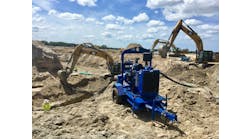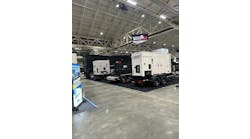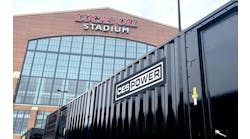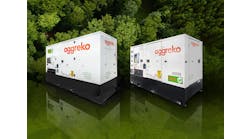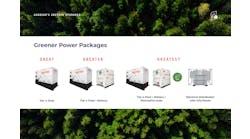If money is power, then shouldn't the converse idea “power is money” also hold true? Well, lucky for the rental industry when it comes to generator rentals power equals big money and the outlook for the future is bright. According to manufacturer estimates, the generator rental market is growing at an estimated 15 to 20 percent annually.
In 2004, strategic growth consulting firm Frost & Sullivan, headquartered in Palo Alto, Calif., estimated that the North American power generation rentals market generated revenues totaling $454.7 million that year, and predicted steady growth leading to revenues of approximately $635.2 million by 2011.
According to Sridhar Anasapurapu, research analyst for Frost & Sullivan's North American Energy Group, the compound annual growth rate from 2004 to 2011 is expected to be 4.9 percent — more modest than some manufacturer's estimates. Still, with annual growth over a seven-year period of nearly 5 percent, the generator market is strong. Combine that prediction with the growing instability of the United States' overburdened power grid, increasingly devastating natural disasters, and construction in some markets outpacing power installation, and rental generators are more in demand now than ever before.
“In some parts of the country new power hookups take weeks or months,” says Marc Leupi, product manager for Wacker's pump, power & light division, Menomonee Falls, Wis. “In addition, emergency preparedness driven by Department of Homeland Security spending has added to the demand for mobile, stand-alone power, as have disasters such as Hurricane Katrina. A rental generator makes the average contractor immune from these problems.”
And it's not just contractors who are driving the demand for generators. Special event organizers, municipalities, other government agencies and homeowners rent generators for dozens of applications, including powering jobsite trailers, power tools, concrete-cutting equipment, heaters, compressors, submersible pumps, tower cranes, welders, back-up power, lighting, popcorn poppers, snow cone machines, inflatables, sound systems and concessions.
And beyond the obvious there are many unusual applications as well. Plymouth Taylor Rental, based in Plymouth, Mass., supplies generators to about 70 percent of the floats for the annual Thanksgiving Day parade, according to manager/partner Dan Shaughnessey. Also, mobile medical units often rely on generator power to run MRI or other imaging equipment. One rental operator noted using generators to power portable restrooms. The multitude of applications adds up to big business, which means big rental revenue.
“We've partnered with some medium and small rental businesses that are exploring niche opportunities with long-term rents and rerents,” says John Raber, regional sales manager for Baldor Electric, Fort Smith, Ark. “We are all aware of the construction market, but there are many niche opportunities out there just waiting to be sold. Take a look around at your local and regional market. We've found that the niche opportunities take a bit of entrepreneurial spirit, sales savvy and determination, but offer a good return.”
The demand for generator rentals is broad. Are you getting the most return from your generator fleet?
Know the electrical fundamentals
When a customer comes in to rent a generator the person behind the counter must know enough about electrics — voltage, amperage, watts, kW — to properly size the generator to the customer's application. Even if a regular contractor customer has a preconceived idea about what he needs, counter people should ask questions: What do you want to power? How long do you plan to run it? In some cases the counter person can recommend a more efficient generator to that contractor, saving him both money on the rental and providing better fuel economy from a properly loaded unit. Additional accessories such as extra-run fuel tanks, distribution boxes, cam-lock panel and cables may also be required to make the most out of the rental. Homeowner customers are much more likely to depend on a rental center's expertise to get the right generator for their application, be it a do-it-yourself home improvement project or back-up power after an electrical outage.
“Most manufacturers have power requirement tables and calculators available to refer to, so working with a supplier, the rental store will have basic information available as a reference for recommending a specific generator for requested applications,” says Tom Pernice, marketing and product planning, Honda Power Equipment, Alpharetta, Ga.
Even better than relying solely on manufacturer-provided tables and charts, rental companies should take advantage of factory training programs provided by generator suppliers. Some OEMs offer extensive training on topics ranging from generator sizing and electrical theory to generator and engine servicing. Counter people should also be educated about electrical and load requirements for common generator applications. For additional training, the Electrical Generating Systems Association, based in Boca Raton, Fla., offers a well-recommended generator-training course.
“In this business, a knowledgeable rental team will help establish credibility with customers; providing them with the best solution and quickly solving any problems that may arise,” says Leupi. “Often customers are not very knowledgeable (or comfortable) about electricity; getting them to a comfort level is part of the value the rental center should be providing.”
Though some electrical principles remain the same year after year, a refresher course is a good idea every one to two years because engine technologies are constantly evolving.
“It's a tough market,” says Chris Rizzo, general manager for Gen Power, a generator rental specialist based in Carol Stream, Ill. “You better know your customer and understand their business. You need to be able to give them what they need and not necessarily what they ask for.”
To market, to market
Rental companies that don't already have generators in their fleet or that are thinking about expanding their offerings, should talk to their customer base to find out what their needs are. Take a look at the competition to see what they have available. Are there any underserved market niches that you could fill with additions to your fleet? Because different features are required for different applications — low noise for hospital, special event or residential neighborhood uses for example — it's a good idea to have a variety of sizes to meet the needs of contractors, homeowners and special event users. Small and medium-sized rental companies can also benefit from having generators that are flexible enough for multiple applications.
“A number of manufacturers offer options and accessories that make the base generator significantly more versatile,” says Leupi. “Examples of such options include electronic governors to run sensitive electronics, remote start capability for temporary standby applications, cam locks for sound and light equipment, and extended run time fuel tanks for running equipment over a weekend.”
Rental companies can further prime the market and potential customers in their area by contacting local search and rescue organizations, emergency relief agencies such as the Red Cross, as well as volunteer groups, suggests Randy Caillier, assistant vice president, product services for La Mirada, Calif.-based Makita.
“Review the types of companies and factories that have a process that can't allow a shutdown should the electricity fail; contact them to let them know you can support them in those emergency times,” Caillier says.
Further spread the word by sending a direct-mail piece to Caillier's suggested agencies and groups as well as your current customer list. “Then, attend your local builders or tradesmen association meetings,” continues Caillier. “Bring some of your generators with you; volunteer to speak on the topic of selecting the right generator, or proper care and feeding of your portable power unit.” Prior to the meetings print some stickers or magnets with your rental company's regular and emergency phone numbers to pass out to attendees. “Top of mind, first one called,” says Caillier.
To illicit generator business from walk-in customers, rental companies should set up a showroom display that features both generators for rent and for sale. Include accessories such as power cords, covers, DC charging cords and transfer switches in the display to increase convenience for customers. If space is tight, hang banners or other signs in the showroom to advertise that you have a generator line available, suggests Pam Meyer, equipment sales manager for Subaru Robin, Wood Dale, Ill.
“Rental stores often miss the opportunity for retail sales,” says Honda's Pernice. “Many customers would welcome the opportunity to purchase generators as well as rent them. While the rental store may benefit from a one-time rental, many never offer generators for retail sale to the customer.”
Rental companies should analyze the opportunities for generator needs in their area. Does it make sense to carry an inventory of generators for retail sale? Ask a couple questions: Does your geographic location lead to frequent power outages caused by seasonal weather patterns? Does an overburdened power grid in your area cause brownouts in the summer months? If you answered yes to either of these questions, you probably have excellent opportunities to offer generators for sale as well as rent. Get the word out to your customer base by advertising these offerings in your Yellow Pages ad as well as on the Internet and in other local media.
Also, rental companies can take advantage of opportunities to rent generators to customers who come in to rent complementary products such as power tools, submersible pumps or anything that requires electric power to operate. Rental companies that want to maximize generator rentals should train counter personnel to ask a customer renting a power tool, “Do you need a generator to run that?”
“Create opportunities for yourself to make the package,” says John Michael Paz, president of Bridgeport, N.J.-based Godwin Pumps.
Power up
One of the most important things a rental company can do to power up its generator rentals and sales is to cultivate a good working relationship with the manufacturer. Many manufacturers will provide training to employees either at the rental center or at one of their facilities. If you haven't selected a generator supplier yet, ask around to find out what kind of reputation both the manufacturer and the product have.
“A quality product, good factory support, good product availability are all important factors in the buying process,” says Leupi.
Rental companies should also consider the terms of the warranty offered by different manufacturers. According to Leupi, the length of the factory warranty is often shorthand for how seriously the company takes quality and reliability. Because a longer warranty costs a manufacturer more money, generally only companies that are very confident in their products will offer them. Look for a bumper-to-bumper warranty, which typically covers everything but the engine, which is often covered separately by the engine manufacturer.
In addition, rental companies should find out ahead of time what the manufacturer's after-market service support is like. Ask for a testimonial from another customer and call them yourself to find out firsthand what their experience has been. Does the manufacturer have a toll-free number for service issues? If so, call it to find out how knowledgeable the person on the other end really is. If a generator in your fleet should need service in the field, does the manufacturer have a field sales and service presence in the area to provide timely service?
“The manufacturer should have a good parts and service network and an easy single-source warranty system to make it easy for the rental store to repair their equipment,” says Meyer.
Generator experts agree, determining the size range and number of units to purchase is largely market driven. A rental center should evaluate the size and type of its customer base. Knowing its customers and what they will power with a rented generator is critical for a rental company when deciding what units to add to its fleet.
As a basic guideline, a survey of generator manufactures suggests that a small rental company can get started with four to six generators in the 3 kW to 10 kW range. A medium-sized company will probably need 20 to 25 units in the 5 kW to 70 kW range. “That will cover just about anybody that would walk in,” says Tom Pahl, generator sales specialist for Ingersoll Rand. “Normally, a medium-sized rental company wouldn't need to go above a 70 kW.” Of course, these guidelines are completely dependent upon the customer base of each individual rental business.
“Long before you buy you should be visiting the potential customers to see for yourself what size they most often need; ask lots of questions in terms of what features they most appreciate,” says Caillier.
Generators as large as 70 kW are probably not a necessity for most small to medium-sized rental fleets. Though models larger than 70 kW are found in rental fleets, the demand for these larger sizes is far less, according to Wacker's Leupi. In addition, the initial investment for acquiring and maintaining these units is much higher than for their smaller counterparts.
“A good alternative might be to set up a re-rent arrangement with a nearby power rental dealer for the occasional rental requiring larger sizes,” Leupi says.
Some manufacturers produce welding machines that also have some built-in generator capacity. Though primarily designed and sold as welding units, these machines can also be rented for their generator capacity, particularly when a rental company wants to increase its utilization or has a strong demand for generator power caused by a natural disaster or other emergency power outage.
“The cost of a welder that has generator capability can be very close to a generator-only product,” says Jeff Moureau, general manager for the rental division of Miller Electric, Appleton, Wis.
Some customers will ask for specific features for specialized applications. Low-noise units are needed for hospital and municipal use, and such things as easy starting capability, serviceability, durability and high fuel capacity are desirable to all users.
“Do not buy inexpensive,” says Makita's Caillier. “Remember, your customer already has a problem with no electricity. When he comes to you to rent you must deliver a quality unit that won't let him down. Spend more on these units so you don't become the person who causes a second emergency.”
Some rental companies prefer to buy units that have sufficient run time to last from Friday afternoon until Monday morning. Contractors especially will appreciate not having to worry about refueling the unit at the jobsite over the weekend, says Rizzo. If you don't already, provide refueling service to generator customers so they don't need to hire a separate refueling company to do the job. According to Rizzo, this is a thoughtful customer convenience and can be a competitive advantage in a saturated rental market.
Fuel costs have plateaued at an all-time high, putting strain on all businesses, particularly those that rely so heavily on fuel to operate. The fuel efficiency of generators, however, is primarily dependent on the efforts of engine manufacturers who are also struggling to meet the stringent demands of the Environmental Protection Agency's emissions standards, says Leupi. “Ironically, the new lower emissions engines actually tend to be less fuel efficient than their ‘dirtier’ predecessors.”
Inverter generators, however, provide better fuel efficiency because engines are governed to increase rpm only as load is applied, conserving fuel and extending engine life. Keeping engines well tuned with regular maintenance will also improve fuel efficiency.
“Often we see rental companies simply rent a larger generator to handle a large motor-starting requirement,” Leupi says. “While this addresses the customer's power issue, it is inefficient and potentially damaging to the generator engine. A properly sized generator will provide the lowest cost power and ensure that the generator engine is properly loaded. Since motor starting is a key factor in sizing, buying generators with better motor starting will allow the rental company to size the smallest generator for the application.”
Powerful future
Generator manufacturers agree that the market will remain strong as long as the demand for power continues to grow. Contractors, continuing to look for ways to save money on fuel, are going with more electric-powered equipment to get their jobs done. An overburdened national infrastructure and weather-induced power outages further propel the demand.
“As we become more dependent on electrical energy the opportunities for generator rentals continue to grow,” says Baldor Electric's Raber. “We've seen a real increase in our customers' long-term rents, in terms of months and even years. This is a growing market that we're excited to be a part of.”
But as demand grows, so, too, does competition in the rental channel. Many national rental companies have launched successful generator rental divisions that specialize in large and specialty power applications. Most manufacturers agree that these specialists are good for the overall generator rental market, raising the level of expertise and support in power rental, but that there is still plenty of opportunity for general rental companies to provide more modest-sized generator rentals to the marketplace.
One thing is certain; the market continues to grow even outside of the rental channel. In the metropolitan Chicago area, new standby power regulations have made it mandatory to have standby generators for buildings over three stories and buildings that have elevators, according to Gen Power's Rizzo.
Another trend spreading across the U.S. is the inclusion of back-up generators in upscale new home construction. Just as people began adding built-in air conditioning units decades ago, now back-up generators are a luxury wealthy homeowners can't live without. Plymouth Taylor Rental's Shaughnessey predicts that within the next five to 10 years, back-up generators will be a staple in most homes.
Power generation is a burgeoning market segment from all angles. There are many opportunities for rental companies to take advantage of the demand and look for ways to meet the needs of contractors, homeowners and others with power needs in their own markets.
